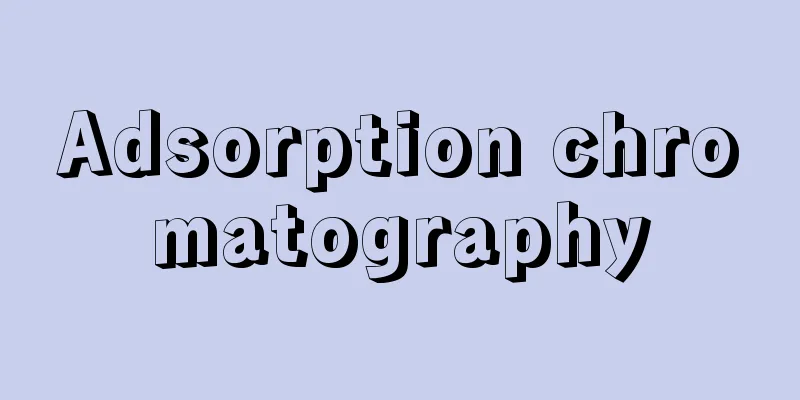Adsorption chromatography

|
This is one of the types of chromatography broadly classified by separation mechanism. The basic concepts that characterize chromatography are the stationary phase and the mobile phase, and the difference in the adsorption, solubility, and volatility of substances between these two phases is used to separate substances. The stationary phase is usually a fine powder solid with an adsorbent surface, or a liquid with a liquid film covering an appropriate carrier. In principle, in the former case, separation occurs mainly due to the difference in the adsorption power of the substance to the stationary phase and the mobile phase, so this is called adsorption chromatography. On the other hand, in the latter case, separation occurs mainly due to the difference in the distribution power between the two phases, so this is called partition chromatography. Examples of stationary phases include silica gel, alumina, activated carbon, magnesium carbonate, magnesium oxide, polyethylene-based porous polymers, and starch. Water, alcohols, and various other solvents are used as the mobile phase, either alone or in mixture. When a liquid is used as the mobile phase, as in this case, it is called liquid chromatography (liquid-solid chromatography), and when a gas such as hydrogen or helium is used as the mobile phase, it is called gas chromatography (gas-solid chromatography). [Takada Takeo] [Reference] |Source: Shogakukan Encyclopedia Nipponica About Encyclopedia Nipponica Information | Legend |
|
クロマトグラフィーを分離機構により大別した場合の1種である。クロマトグラフィーを特徴づける基本概念として、固定相と移動相があげられ、この両相間への物質の吸着性、溶解性、揮発性などの差を利用して物質の分離が行われる。固定相は普通、表面が吸着能をもつ微粉末固体か、適当な担体を液膜で覆った液体であり、原理的にみると、前者の場合には、主として固定相と移動相への物質の吸着力の差によって分離がおこるので、これを吸着クロマトグラフィーとよぶ。一方、後者の場合には、分離が主として両相間への分配力の差によっておこるので、これを分配クロマトグラフィーとよぶ。固定相としては、シリカゲル、アルミナ、活性炭、炭酸マグネシウム、酸化マグネシウム、ポリエチレン系ポーラスポリマー、デンプンなどが用いられる。移動相には水、アルコール類その他種々の溶媒が単独または混合して用いられ、この場合のように移動相に液体を用いる場合は液体クロマトグラフィー(液‐固クロマトグラフィー)といい、移動相に水素、ヘリウムなどの気体が用いられる場合はガスクロマトグラフィー(気‐固クロマトグラフィー)という。 [高田健夫] [参照項目] |出典 小学館 日本大百科全書(ニッポニカ)日本大百科全書(ニッポニカ)について 情報 | 凡例 |
<<: Adsorption indicator - Kyusyu Kushiyaku
Recommend
oxpecker
…The African species Lamprotornis (16 species), O...
A Terms and Conditions - E-kiyaku
…the International Covenant on Economic, Social a...
Phnom Penh - Pnompenh (English spelling)
The capital of Cambodia, located in south-central...
Toboku
A Chinese poet of the late Tang dynasty. He also ...
Galactaric Acid - Galactarsan
C 6 H 10 O 8 (210.14). Also known as mucic acid. ...
"Ennen Nasu no Yoichi" - Ennen Nasu no Yoichi
...This episode from the Tale of the Heike has ma...
"The Three Groups of Lovers, Soga"
…He wrote hit kyogen plays such as Edo Murasaki K...
Rerum vulgarium fragmenta (English spelling)
…Petrarch's Italian poetry collection. The ti...
Kondo
〘Noun〙① (Named after the golden Buddha statue ensh...
Market structure
Traditionally, industrial organization theory has ...
Eutectoid alloy
…Normal steel is a two-phase alloy of ferrite and...
Meridien (English spelling)
…In the 18th century, the duchesse brisée, a simp...
Ganpi (Ganpi) - Ganpi
A deciduous shrub of the Thymelaeaceae family (AP...
Naba Kassho
Year of death: 1648.1.27 Year of birth: Bunroku 4....
Wehnelt, B.
...They said that there are two types of substanc...









